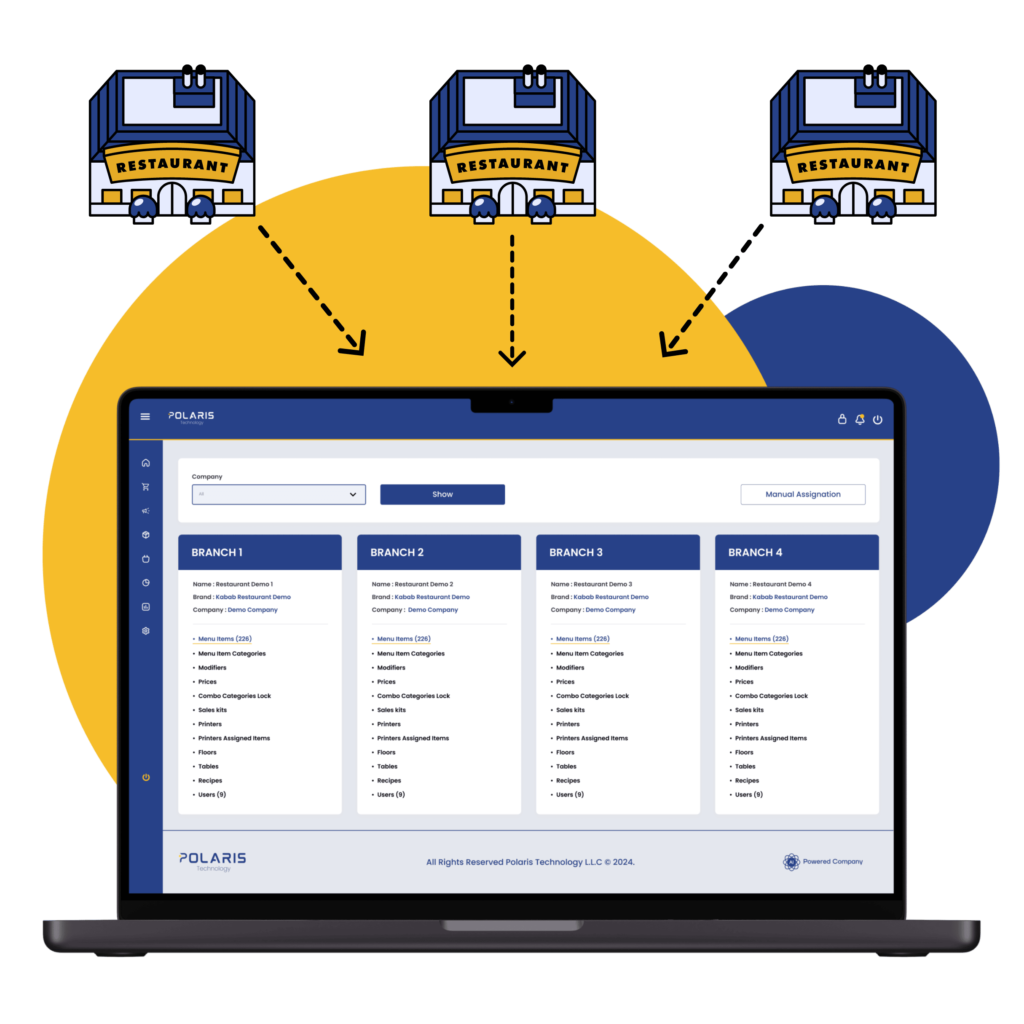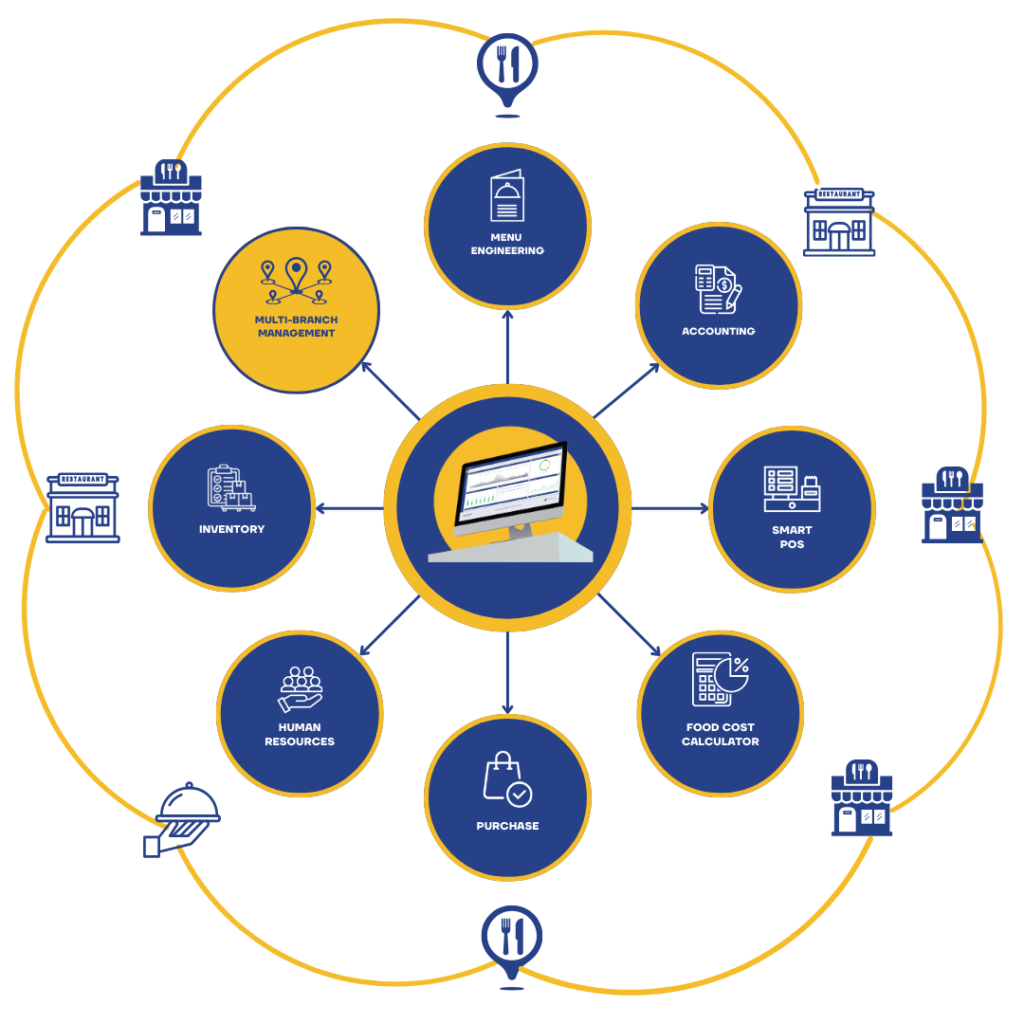Centralized Multi-Branch Restaurant Software
For restaurants operating multiple branches, the challenge to centralize processes, operations, and expense management, as well as maintain food consistency, is significant. These difficulties can impact the bottom line and overall sales performance.
With Polaris ERP, multi-branch restaurant management transforms into a streamlined process, ensuring that all operations are aligned across every location.

What Is a Centralized Multi-Branch Restaurant Management Software
A centralized multi-branch restaurant management software is an advanced feature available with Polaris ERP, which allows restaurants to manage multiple branches in a single platform. This helps to streamline operations, align processes and resources, and ultimately optimize costs and boost revenue.

How Does it Work
Polaris ERP’s centralized system enables admin users to seamlessly set up multiple branches from a single interface. Once the details of a new branch - such as location, opening hours, and menu items - are entered into the system, it becomes interconnected with the other branches of the restaurant.
This connection provides comprehensive visibility into shared systems, including sales data, inventory management, purchasing, accounting, menu engineering, recipe management, food cost calculations, payroll, and more.
Centralization allows all systems and activities to be monitored, managed, and controlled from one platform. This capability facilitates branch-to-branch comparisons, enabling performance assessments across days, weeks, months, or specific timeframes. Additionally, it facilitates control and alignment over expense and resource - such as food items and staffing - resulting in optimized operations.
Benefits of a Multi-Branch Restaurant Software
Control Expenses
Centralized management allows restaurant operators to track and control expenses across all branches effectively. By having a comprehensive view of costs, businesses can identify areas of overspending, negotiate better supplier contracts, and implement cost-saving measures consistently.
Compare, Learn, and Grow
Centralized management enables easy comparison of performance metrics across branches, allowing operators to identify best practices and successful strategies. This insight helps restaurants continuously streamline operations, improve and grow their business, including boosting revenue.
Real-Time Insights
A centralized platform provides real-time data across all branches, allowing managers to monitor sales, inventory levels, and operational performance instantly. This immediate access to information helps in making informed decisions quickly, addressing issues as they arise, and maximizing emerging opportunities.
Streamlined Operations
A centralized system streamlines processes, ensuring consistency in operations and customer experience across all branches. This uniformity helps maintain brand integrity and simplifies training for staff, as everyone adheres to the same standards and procedures.
Problems Multi-Branch Restaurant Software Solves
Resource Allocation Challenges
With a centralized view of operations across all branches in the system, restaurant businesses can better allocate resources - such as staff and inventory - across branches based on demand, improving efficiency and reducing shortages or overages.
Comprehensive Cost Tracking
Polaris ERP centralized multi-branch management system provides an overall view of expenses across all branches. This allows operators to track costs in real-time, identifying trends and areas where spending may be excessive.
Negotiating Power Limitations
With multi-branch restaurant management, restaurant operators can aggregate purchasing data from all branches, giving them an increased advantage to negotiate better prices and terms with suppliers. Bulk purchasing can lead to discounts, further reducing costs.
Efficient Inventory Management
By monitoring inventory levels across branches, businesses can optimize stock levels, reducing excess inventory and associated carrying costs. Unused items can be transferred to branches facing shortages, minimizing spoilage and waste while ensuring efficient resource allocation.
Multi-Branch Restaurant Management Software FAQ
Centralized multi-branch restaurant management provides real-time data analytics across all locations, allowing operators to identify performance discrepancies and operational inefficiencies. By comparing metrics such as sales, expenses (excessive food costs, delivery expenses, etc.) and inventory usage (spoilage, non-movable items, waste), management can identify underperforming branches and areas for improvement and implement targeted strategies to reduce unnecessary expenditures and optimize resource allocation effectively.
A centralized restaurant ERP like Polaris ERP is perfectly fitted to manage multiple restaurant branches. As all expenses, inventory, payroll, supplier management, and other areas of the business are available within a single platform, this allows visibility into identifying various areas that can be optimized.
For instance, its function “Supplier Transactions Report” provides visibility into the costs associated with each supplier for different branches. With multiple-branch management and supplier coordination in the same system, operators can better negotiate prices with suppliers, based on the economy of scale principle (ordering higher quantities at lower prices).
The system is also perfectly equipped to identify inefficiencies, providing AI-recommendations (based on operators’ own data), on how to overcome them and come back profitable.
Polaris ERP provides a powerful centralized multi-branch management software that empowers restaurants to scale efficiently when expanding to multiple branches or new locations. By offering a single platform to manage operations across all establishments, Polaris ERP streamlines processes such as inventory management, sales tracking, and staff scheduling across all branches.
This centralization allows restaurant operators to maintain consistency in food quality and service, ensuring that each new location is aligned to the brand’s standards. Additionally, with real-time insights into key performance metrics, operators can identify successful strategies and best practices that can be replicated in less performing or new branches.
The system also enhances resource allocation, enabling better planning for staffing and inventory needs based on demand forecasts, which minimizes waste and optimizes expenses. Overall, Polaris ERP equips restaurants with the tools needed to scale effectively while maintaining operational excellence.
Related Blogs
Multi-Branch Restaurants Updates
Continue reading our blogs on Centralized Multi-Branch Management
